Travel Tips: Part 4 – Security and General Suggestions for International Travelers

Travel Tips: Security and General Suggestions for International Travelers
Travel Tips: Part 4 – Security and General Suggestions for International Travelers
By Dan Dudek
- If you purchase new shoes for the trip, be sure to thoroughly break them in well before your travel. In many European countries, most locals wear black clothes a great deal, and black sneakers as well. To avoid standing out as a “tourist” you may want to purchase and pack similar items. So if you purchase new black sneakers, be sure to use them at home for several weeks before you leave on your trip.
- If you will be doing international travel with expensive items, such as camera equipment, it is recommended you register the items with the Department of Homeland Security’s U.S. Customs and Border Protection (CBP) agency. You will need to complete Form 4475, Certificate of Registration for Personal Effects Taken Abroad; take your items to a CBP or Customs office; and have a CBP officer sign the form. It is recommended you take all such items you will possibly be traveling with on your next and all future trips—the completed form does not expire. Having the completed and signed form will prove you did not purchase the listed items while traveling, and thus not subject to being declared when you return to the U.S.
- If you plan on renting a car, realize that most European countries charge much more for one with an automatic transmission. If you have not driven a car with manual transmission in several years, you might want to borrow a friend’s car and do some practicing. If you feel comfortable, and are okay that you may have to do all of the driving, then renting such a car can save you a good bit of money. When you pick up your car, be sure the gears are clearly marked (including REVERSE), and you can shift into all gears correctly before you leave the rental area. Be sure to ask questions about local driving laws; are given instructions as what to do and who to call if involved in an accident; and inspect the car for any damage and or worn tires.
- For most international trips, you do not really need to rent a car. Traveling within a city is best done by foot, subway, buses, cabs, streetcars, ferries, etc.
- Traveling between cities is frequently best accomplished by trains, especially in Europe. A very economical way to travel by train in Europe is to purchase a multi-country or multi-day pass. There are a number of such passes that are available. The cost depends on the number of countries in which you will be using the train, how many days of train travel, and the period of time in which you have to complete your traveling. You will need to do a bit of research (www.eurail.com is one source) before you purchase such a pass, and you must purchase the pass before you leave the U.S. Check the detailed requirements. Also, be sure to check the Saver Pass for typically a 15% discount when two or more people are traveling together. Note: We recommend First Class when traveling by train; the cost is not that much more and it is typically a more pleasant and safer experience. Understand that a “reserved” ticket for seats in a compartment will normally only apply for part of the train’s route; so if you not have a reserved seat, you can use any “reserved” seats if your travel does not overlap the segment reserved.
Note: When traveling by train, especially when in the Economy section be very aware of thieves. They often wait for someone traveling along to leave their bags to go the Water Closet or Restaurant, or to fall asleep. Then they quickly go through your bags looking for cash, electronics, passports, etc. It is strongly recommended you use a hidden money-belt and kept any valuables in it or a bag you always carry.
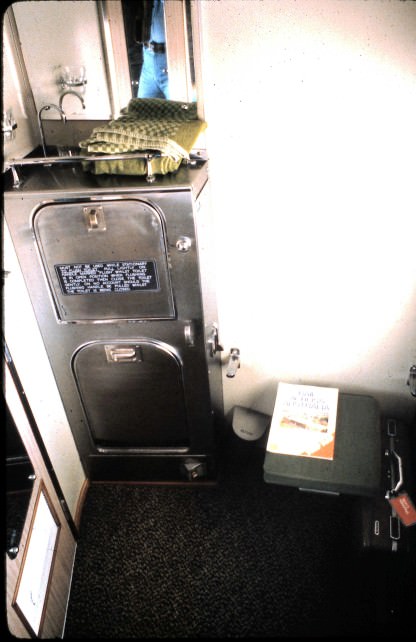
When I traveled across Australia by train in the 1980’s, my private First Class compartment had its own “WC”. Above is the WC folded, and then below, unfolded ready for use.
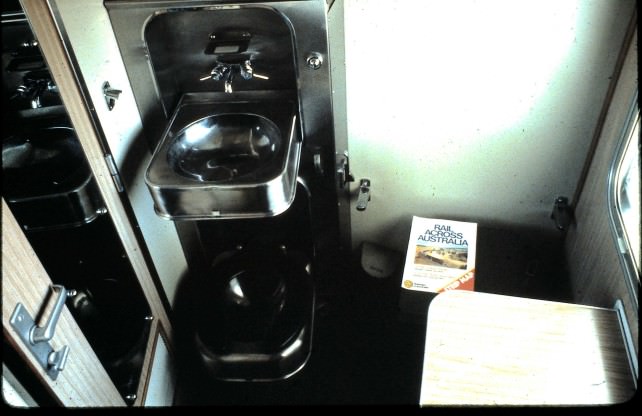
Train WC in Private Compartment
- Learn to speak a few key phrases in the language of the country you are visiting. Most travel guides provide a list of key phrases, and you can use the Internet to supplement your list if you so desire. The Internet is a great source for translating phrases or documents from one language to another.
- Consider purchasing an electronic translator or obtain a similar application for your cell phone. We recommend a “talking” translator as it helps you pronounce the foreign words and phrases correctly. The cost of such devices has really come down in price the past few years to the point that they are very affordable.
- Get a Cell Phone that has coverage where you expect to travel. Consider investing in an international type of phone that works in most countries. An alternative is to get a “rental” cell phone from your service providers.
- If you take any prescription medicines, be sure to pack them in your carry-on bag, i.e.do not check them. Keep the pills in the original containers from the pharmacist. Also, have your doctor write out an extra prescription for all of your medication; then take a copy of the prescriptions. Keep the originals in a safe place, and the copy in your “Money Belt.”
- Always carry on your person, a current list of all medications you are taking; and your insurance card.
- If you, or anyone in your traveling party, has medical issues, consider building a file of all relevant history and putting it on a “thumb drive” that you can carry.
- Take copies of your Passport and Driver’s licenses, and store them separately from the originals. If you ever lose your Passport, having a copy (of the first inside page) will greatly facilitate obtaining a new one.
- Credit cards are great for getting local currency while traveling. Just be sure you have a “4 digit PIN.” There are many countries that have ATMs that only accept a PIN with four numbers. Also, it is best if you call your Credit Card company before you leave the U.S. and inform them of your pending travels. This will insure they do not put a “security hold” on your cards when overseas charges start to appear.
- Copy the front and back of all your Credit Cards you will be using in your travels and place these copies in a secure and separate location from where you are carrying the actual cards. This will give you all the account numbers and customer service contact telephone numbers in case your cards are lost or stolen.
- Drink tonic water and do leg exercises on the plane to help avoid leg cramps and blood clots. Depending on your age, this may not be critical, but I encourage you to be on the safe side. I have always done the leg exercises on plane trips. Recently I have added the regime of drinking as much tonic water as I can, starting a couple of days before flights or even a long drive. The quinine in the tonic water does make a noticeable improvement in the reduction in the leg pain I experience.
- Pack ear plugs and a sleep mask. Many times in Europe you will want to sleep with the windows open due to the general lack of air conditioned rooms. However, in doing so the street lights and noise can prevent you from sleeping well – unless you are prepared. Getting a good night’s rest helps you keep your guard up and allows you to cope better with any situation. (Note: ear plugs and a sleep mask can make sleeping in an overnight train much easier; just take extra precautions when sleeping that your bags are well protected from thieves.)
- Pack as little as possible. The fewer bags you have, the easier it is overall. If you buy things while overseas, consider shipping them (or something you are carrying) back to the U.S. Carrying few and lighter bags makes you a less likely target for pickpockets.
- Do consider putting in your checked luggage, a small plastic bottle of Woolite (or similar clothes cleaner). To reduce the amount of clothes you pack, plan on going to Laundromats (or use the hotel’s service) as you travel. However, to reduce the time, expense and hassle of getting your clothes serviced, you should consider spending a few minutes every other night or so, hand cleaning some items in your hotel sink. When finished squeeze as much water as possible from the items, and roll them in a clean dry towel. Press on the “roll” a few times. This will get your items relatively dry very quickly. You can then use a hair dryer or simply hang the items to finish drying overnight. I also recommend carrying a light rope about eight feet long. This rope can be used for all sorts of things, including a clothes line.
- Always be on your guard for pickpockets. Many times they work in teams. One to distract or bump you, one to do the lift, and runner who is passed your item to protect the “lifter.” Sometimes it is groups of young children who surround you asking for change; one or two in the group will be putting their small hands in your pockets and they may not even care if you notice—they will run away faster than you can pursue. Another scam is for someone to announce in a crowd that there are pickpockets working the area. In all likelihood, this person is involved in the activity; he/she is trying to get you to reach to touch your wallet to ensure that it is safe. In reality, the pick pocketing team is watching for you to tell them by your action which of your pockets to target! Be aware of these schemes and take precautions such as: keep your large denomination money in a money belt (see below); keep your wallet in an inside pocket, and place a rubber band around it to make it harder to be lifted without you noticing; do not wear expensive watches, rings or jewelry when traveling, especially not when carrying large bags.
- Use a “money belt”. I like the one that fits just inside your pants, on top of your underwear. They are usually white, with a couple of 2 zippered pockets. A band that fits around your waist is attached. (You can also rig the “money belt” so it hangs from your neck, under your shirt.) In this belt (or pouch) I carry a few large denominations of currency, my Passport, driver’s license and a back-up credit card. If you have medical issues, you should also include a list of all your current medications, a summary of your medical history, and list of anything to which you are allergic.
- Many hotels provide in-room safes for their guests to use, or you can use the hotel’s safe located near the Reception Desk. Use these safes to store your valuables, including your Passport, camera, extra currency, etc.
- When you check into a hotel, take a few of the hotel’s business cards. Be sure to carry a couple each time you leave the hotel. If you get a bit lost, or quickly need to return to your hotel, you can use the card to get directions or give to a cab driver.
- Place the hotel’s business card inside your purse, wallet, backpack and carrying cases of all your electronics. This makes is easier for the person finding your item to try to return it to you.
- In many cities, especially those in France, dinner is a several hour event (and one you will usually thoroughly enjoy). For better restaurants everywhere in France, and for most good restaurants in smaller French towns, you will need a reservation for dinner. Do not lose the opportunity of a great meal by failing to make your dinner reservation when you locate a good restaurant during your afternoon exploring. The “plate du jour” or plate of the day is usually a good choice as it includes several courses of reasonably priced fresh local food. Be prepared to pay with the local currency as credit cards may not be accepted. (This is not a safety item, just something I thought I would mention.)
- Don’t drink the water. This may sound over protective, but I try very hard not to drink the local water when I travel. This includes avoiding ice cubes and brushing your teeth using bottled water. It is not that the water is bad, it is just that all local water supplies have micro-organisms that are specific to the area. Your system may or may not be able to adjust to the new micro-organisms without a period of “discomfort.” It is also for this reason that before I leave on a trip, I get a prescription filled for diarrhea medicine – I have had at least two “emergency” situations when I had to take the medicine.
- If you do buy a number of things, be sure you understand what is required to get your Value Added Tax (VAT) returned. Usually you have to have the items with you (i.e. they should not be in your checked luggage), their receipt and maybe a paper from the vendor – and go to a special office at the airport or train station.
Bushnell Digital Compass
- When I travel, I always carry a small compass. For example, when you use a subway and get up to street level, sometimes, like on a cloudy day, you do not know which way to go. You usually know you want to go “south”; but which way is “south” may be a problem. If you are in a hurry, and the blocks are very long, a compass can really save you a lot of time and help keep you out of areas you would rather not venture.
- Use a GPS device or a GPS application. Personally I use a Bushnell Back-Track device. It allows you to enter four different locations by pressing a button, and then it tracks the direction and distance to return to each location. It is great for locking in meeting points when getting off a tour bus, or your hotel.
- If you decide to attend a museum or similar culture venue, it is highly recommended to purchase the audio tape tour if available. While you may not want to incur the expense, the detail audio explanation of items you are seeing makes a huge difference in level of experience, and your ability to retain the images and facts for years. (Again, not a safety issue but something I want to recommend.)
- If swimming, ask the locals for information about any hazards, especially poisonous fish, snakes or other such sea creatures. (For example, if going to Australia’s Great Barrier Reef, it is best to avoid the Box Jelly Fish season; and to know what a Stonefish looks like – both can kill you!)
Picture of a Lion Fish (Pterois), the Dorsal spines on this Fish Contain the Poison
Right: a picture of a Lion Fish (Pterois), the Dorsal spines on this fish contain the poison.
- I always carry a small candle and matches in my personal hygiene bag. I always keep these two items in my bag, and I use my bag every day (in my business I really never fully unpack when I am home). There will be times, especially overseas, when the hotel will lose electricity (especially if you are not staying in a five or four start hotel).
Anyway, if your hotel loses all electric, you will be surprised how much light just one candle can provide, and it does so for a long time. It is much better than a flashlight. We will put a mirror behind the candle to double the light when we can. The candle and matches do not weigh anything, and take up almost no room to pack, so they are a good insurance policy. We also always carry two small LED type flashlights and place them on our bed stands.
- When you do return to the U.S., be sure to declare everything. For an extended trip, it helps to maintain a list of all things purchased, updating it every other day or so. Even if you exceed the limit for certain items, declare it! In many situations if you bring back a bit more of something than is permitted, you will get a warning and be on your way. If the items are of significant value, you may have to pay the duty. However, if you do not declare such items, you will be subject to having the items confiscated and have to pay a fine.
Read More in Dan Dudek’s Travel Tips Safety Series:
Travel Tips: Travel Safe and Smart
Part 1 — Things to Consider Before You Take a Trip
Part 2 — Traveling by Airplane
Part 3 — Hotel Safety
Part 4 — Security & General Suggestions for International Travelers
Bio:
Dan Dudek travels extensively and has been to most U.S. states and Canadian provinces; and about 30 countries. He has a private pilot’s license (now inactive) and currently enjoys RV camping, sailing and many outdoor sports. As an Eagle Scout, he practices the scout motto to “Be Prepared” for all situations and confesses to being a person who likes “electronic toys”, especially those security related.

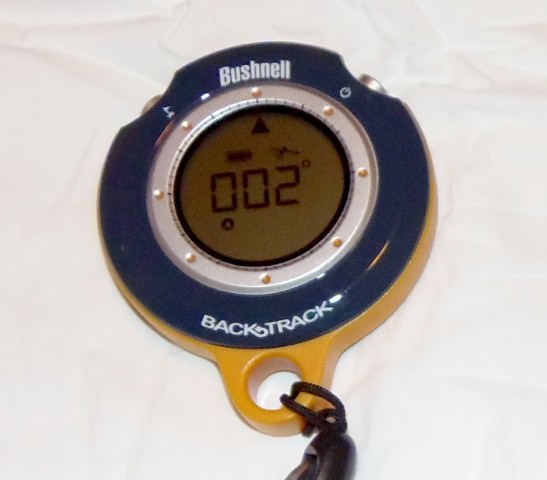
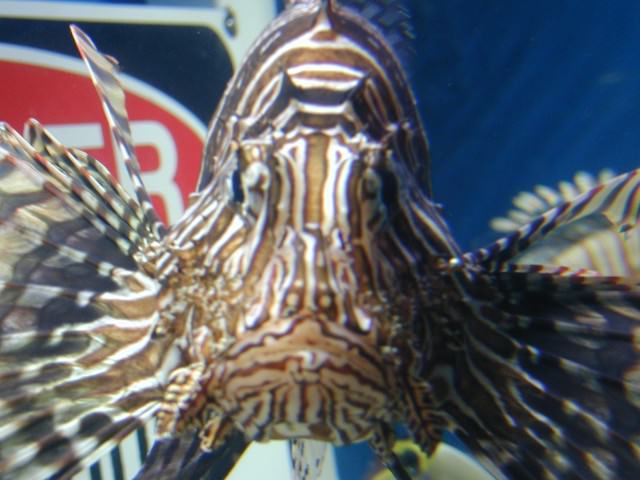
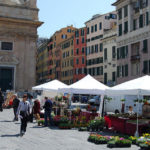
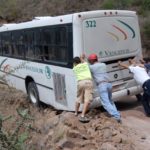

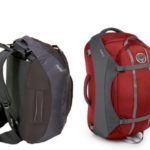





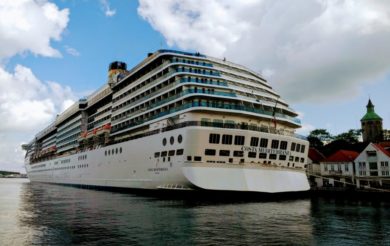

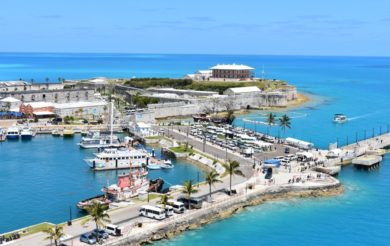

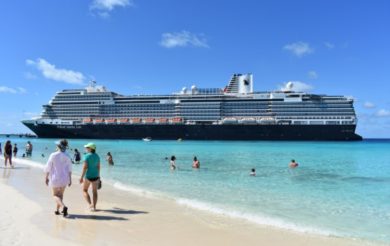






One Response to Travel Tips: Part 4 – Security and General Suggestions for International Travelers